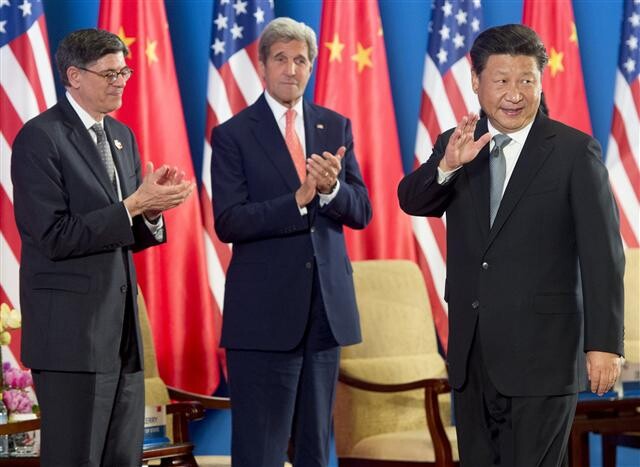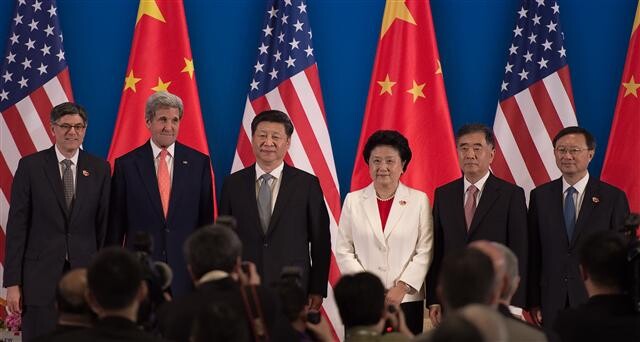hankyoreh
Links to other country sites 다른 나라 사이트 링크
[News analysis] US pushes China to put more pressure on North Korea

The US pressured China to raise the intensity of its sanctions to solve the North Korean nuclear issue during the two countries’ eighth Strategic and Economic Dialogue, which kicked off in Beijing on June 6.
With a battle for leadership beginning already on the first day of talks, the next question is how the results will be reflected in the countries’ actual statement.
Particularly unusual was US Secretary of State John Kerry’s announcement in his opening speech that the US plans to consider the Iranian nuclear issue as a model in addressing the North Korean nuclear issue. Not only did it send a strong warning to China - which has been attempting to mend its frayed ties with Pyongyang with a visit by (North) Korean Workers‘ Party Central Committee deputy chairman Ri Su-yong - but it could also mean the Barack Obama administration plans to continue ratcheting up its own sanctions against Pyongyang for the rest of its term.
Previously, Kerry and other senior US officials had focused on sending a positive message in contrasting the North Korean and Iranian nuclear issues - suggesting Pyongyang could improve its relationship with Washington like Tehran did by abandoning its nuclear program.
But the context of Kerry’s statements this time appears completely different. Recently, the belief that heavy sanctions were the reason behind Iran‘s decision to negotiate in the first place has gained traction with many inside and outside the Obama administration. US experts are also making louder calls to follow the “Iran model” with intensive sanctions against Pyongyang.
At the same time, diplomatic and security advisers to Hillary Clinton, who just clinched the Democratic presidential nomination, have all but officially adopted the position that Pyongyang will need to be brought to the brink of collapse through powerful sanctions before it will agree to negotiations. It’s a mood that may be reflected in Washington‘s recent designation of North Korea as a primary money laundering concern, and its demand that the Chinese electronics and communications equipment company Huawei turn over a list of products exported to countries currently under sanctions, including North Korea.

This heavy push from Washington on the nuclear issue appears almost certain to generate friction with Beijing, which has gone along with United Nations Security Council (UNSC) resolutions and other multilateral sanctions but is opposed to independent sanctions from itself or the US. In his opening address on June 6, President Xi Jinping stressed the continued close cooperation between China and the US on the North Korean nuclear issue - suggesting indirectly that Beijing had “done all it could” in implementing the terms of previous UNSC resolutions sanctioning Pyongyang. As Pyongyang-related tensions mount on both sides with the possible deployment of a Terminal High Altitude Area Defense (THAAD) missile defense system on the Korean Peninsula, the question of the sanctions’ intensity looks to be turning into the front line of their battle.
But it remains to be seen how this tense early battle over the North Korean nuclear issue ends up reflected in the dialogue’s statement, which will be released after the meeting ends on June 7. Even when both sides have begun the talks in the past with an overt battle for public opinion, the actual outcome has often ended up watered down over the course of exchanges on different security-related and economic issues. The US in particular has traditionally placed heavy weight on security and economic issues in its diplomatic negotiations.
By Yi Yong-in and Kim Oi-hyun, Washington and Beijing correspondents
Please direct questions or comments to [english@hani.co.kr]

Editorial・opinion
![[Column] Park Geun-hye déjà vu in Yoon Suk-yeol [Column] Park Geun-hye déjà vu in Yoon Suk-yeol](https://flexible.img.hani.co.kr/flexible/normal/500/300/imgdb/original/2024/0424/651713945113788.jpg) [Column] Park Geun-hye déjà vu in Yoon Suk-yeol
[Column] Park Geun-hye déjà vu in Yoon Suk-yeol![[Editorial] New weight of N. Korea’s nuclear threats makes dialogue all the more urgent [Editorial] New weight of N. Korea’s nuclear threats makes dialogue all the more urgent](https://flexible.img.hani.co.kr/flexible/normal/500/300/imgdb/original/2024/0424/7317139454662664.jpg) [Editorial] New weight of N. Korea’s nuclear threats makes dialogue all the more urgent
[Editorial] New weight of N. Korea’s nuclear threats makes dialogue all the more urgent- [Guest essay] The real reason Korea’s new right wants to dub Rhee a founding father
- [Column] ‘Choson’: Is it time we start referring to N. Korea in its own terms?
- [Editorial] Japan’s rewriting of history with Korea has gone too far
- [Column] The president’s questionable capacity for dialogue
- [Column] Are chaebol firms just pizza pies for families to divvy up as they please?
- [Column] Has Korea, too, crossed the Rubicon on China?
- [Correspondent’s column] In Japan’s alliance with US, echoes of its past alliances with UK
- [Editorial] Does Yoon think the Korean public is wrong?
Most viewed articles
- 1‘We must say no’: Seoul defense chief on Korean, USFK involvement in hypothetical Taiwan crisis
- 2Will NewJeans end up collateral damage in internal feud at K-pop juggernaut Hybe?
- 3[Column] Park Geun-hye déjà vu in Yoon Suk-yeol
- 4Why Korea shouldn’t welcome Japan’s newly beefed up defense cooperation with US
- 5Thursday to mark start of resignations by senior doctors amid standoff with government
- 6N. Korean hackers breached 10 defense contractors in South for months, police say
- 7[Guest essay] The real reason Korea’s new right wants to dub Rhee a founding father
- 8[Column] ‘Choson’: Is it time we start referring to N. Korea in its own terms?
- 9Kim Jong-un expressed ‘satisfaction’ with nuclear counterstrike drill directed at South
- 10[Editorial] New weight of N. Korea’s nuclear threats makes dialogue all the more urgent